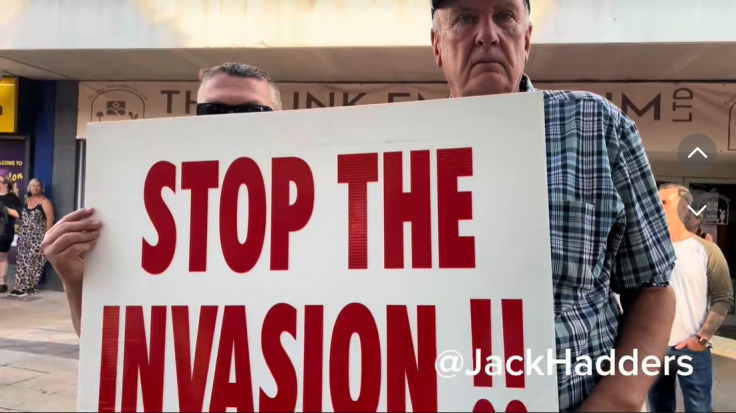
Nearly 2,000 residents of Waterlooville, Hampshire, have expressed their resentment over government plans to house up to 35 asylum seekers in newly constructed flats worth around £250,000 each, as revealed.
The silent procession, outside the Waterloo House flats above shops on Wednesday night, gathered residents who chanted 'send them home', reflecting long-held frustrations about housing deprivation and a lack of transparency from the Home Office.
They complain that whilst local families languish on social housing registers for years, migrants who have just arrived seem to be being prioritised.
A demonstrator told The Mail that 'enough is enough', citing the decline of the local high street, rising homelessness, long housing waiting lists, and unemployment. He described the decision to offer new flats as a slap in the face to struggling residents.
Almost 2000 people chanting ‘Send Them Home’ at peaceful Waterlooville protest this evening attended by members of the community.
— Cllr George Madgwick (@georgedmadgwick) July 30, 2025
This is after the Home Office announced the plans to house 35 migrants in the town centre. pic.twitter.com/1bS70BqPUX
Braverman Leads the Backlash
Former Home Secretary Suella Braverman, the local MP, has launched a petition against the Home Office plan, which garnered over 8,000 signatures in just four days.
Local people in Waterlooville are furious about Home Office plans to house asylum seekers in the town centre.
— Suella Braverman MP (@SuellaBraverman) July 23, 2025
This would be inappropriate, put undue pressure on resources and pose a public safety risk.
Appallingly, the Lab/Lib- controlled Havant Borough Council failed to… https://t.co/a5AKCHuRNO
'Zero offences, arrests and no disorder. You're not far-right. You just love our country and are willing to stand up for it', Braverman declared on social media, praising the demonstration's peaceful nature. Her words struck a chord with residents who feel unfairly branded for expressing legitimate concerns about their community's future.
In a public letter to Home Secretary Yvette Cooper, she condemned the move as 'insulting to local people'. She warned it could turn high streets into 'no-go zones for the patriotic, common-sense majority'.
However, Havant Borough Council urged calm and factual clarity. Council leader Phil Munday noted that the individuals due to be housed are supported asylum seekers, not a large group of single adult males, as some feared. The Council pledged to submit feedback reflecting public concern to the Home Office.
Facts on Housing and Eligibility
Despite public perception, asylum seekers are not eligible for social housing. Under the Immigration and Asylum Act 1999, they are offered basic accommodation and subsistence only if they are destitute, and this is always provided separately from local authority housing allocations. Therefore, claims that asylum seekers 'jump the queue' ahead of British families are factually incorrect.
Nonetheless, the broader frustration is rooted in reality. According to national data, over 1.2 million households remain on England's social housing waiting lists, with some boroughs experiencing delays of up to 10 years for three-bedroom homes.
Hotel Accommodation Costs Spiral
One major driver of the government's housing shift is the soaring cost of placing asylum seekers in hotels. As of early 2025, the Home Office spends an estimated £8 million per day on hotel accommodation for asylum seekers, at a rate of roughly £120–£150 per person per night, depending on the location and services provided.
As of March, over 32,000 asylum seekers remained in hotels, often for over a year due to delays in application processing. These arrangements have been widely criticised as expensive, unsustainable, and inadequate for long-term residency.
Shift to Dispersal Housing and Enforcement Policy
To mitigate the financial burden, the government is accelerating the use of dispersal housing, placing asylum seekers in residential properties managed by contractors like Serco, Clearsprings, and Mears under five-year guaranteed rent schemes.
Critics argue this could impact local rental markets by incentivising landlords to choose fixed-rate contracts for asylum seekers over traditional tenants.
The Home Office has also introduced a 'Failure to Travel' policy, which removes housing and financial support from single adult male asylum seekers who refuse to relocate from hotel accommodation to designated housing. This enforcement strategy aims to expedite relocation, reduce costs, and minimise hotel dependence.
Public Unease Continues

The Waterlooville protest has become a flashpoint in the broader national debate over migration, housing policy, and fairness.
While the government insists the measures are about cutting costs and delivering long-term solutions, locals argue that optics matter, and the image of newly arrived migrants occupying modern flats while long-time taxpayers wait in overcrowded rentals is a bitter pill to swallow.
As the public consultation closes this week, all eyes are on whether the Home Office will reconsider its plan in response to the local backlash or double down on a national strategy that increasingly pits humanitarian obligation against domestic frustration.
Waterlooville's story isn't ending this Friday, regardless of the Home Office decision. It's a microcosm of challenges facing countless British communities where economic decline meets demographic change.







